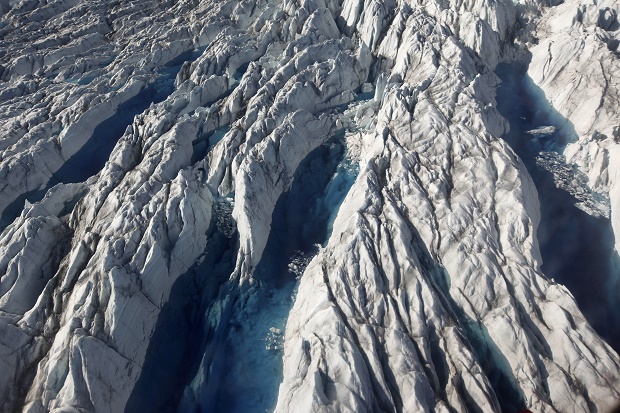Faster retreat of Greenland’s ice sheet observed

In this July 19, 2011 file photo, pools of melted ice form atop Jakobshavn Glacier, near the edge of the vast Greenland ice sheet. Since 1997, the West Antarctic and Greenland ice sheets have lost 5.5 trillion tons of ice (5 trillion metric tons), according to Andrew Shepherd at the University of Leeds, who used NASA and European satellite data. AP File Photo
PARIS, France—The Greenland ice sheet, a potentially massive contributor to land-encroaching sea-level rise, lost mass twice as fast between 2003 and 2010 as during the entire 20th century, researchers said Wednesday.
READ: Greenland ice loss may be worse than predicted—study
Greenland ice loss contributed to a global average sea level rise of 25 millimeters (about an inch) between 1990 and 2010—mainly from surface melt, said the research published in the journal Nature.
The total mass lost was over 9,000 gigatons (billion tons).
It was net loss, meaning the difference between ice melt and ice gain from falling snow or rain.
Article continues after this advertisementREAD: These images may be the most moving from Paris COP21
Article continues after this advertisementThe researchers from Europe and Canada said their study was the first to provide observation-based data of Greenland ice sheet loss from the end of the 19th century, when it started to retreat after the Little Ice Age.
The study therefore contributes valuable knowledge on past and likely future ice sheet loss to be taken into account in forecasts of global warming-induced sea level rise.
Data on the Greenland ice sheet has been lacking in reports of the UN’s Intergovernmental Panel on Climate Change (IPCC), they said.
“In order to predict future sea level changes and have confidence in the projections, it is essential to understand what happened in the past,” study co-author Kurt Kjaer at the Natural History Museum of Denmark said in a statement.
While previous work had relied mainly on mathematical modelling, the new study used data from historical aerial photographs mixed with satellite and other data.
The photos allowed them to study imprints left on the landscape by retreating ice over the decades.
The team found that the ice sheet lost about 75.1 gigatons per year in mass from 1900 to 1983, 73.8 gigatons per year from 1983 to 2003, and 186.4 gigatons per year from 2003-2010.
“The authors show that the recently observed increase in mass loss of the Greenland Ice Sheet, and its resulting contribution to sea-level rise, appear to be unprecedented since the Little Ice Age,” said a Nature summary.
“They suggest that the overall pattern of mass loss and sea level rise they observe is likely to continue for the near future.”
The study was not designed to make specific projections as to future loss.
Ice sheets are masses of ice that are on land, and thus add to sea level when they melt. Sea ice, which floats on the ocean surface, does not make any such addition.
Second to Antarctica as the world’s biggest ice sheet, Greenland would cause Earth’s sea levels to rise 7.2 metres (23.4 feet), drowning low-lying coasts and deltas, if it lost all its ice.
But this is a doomsday scenario ruled out by most climate scientists unless global warming scales unprecedented peaks and is sustained for a very long time, possibly centuries.